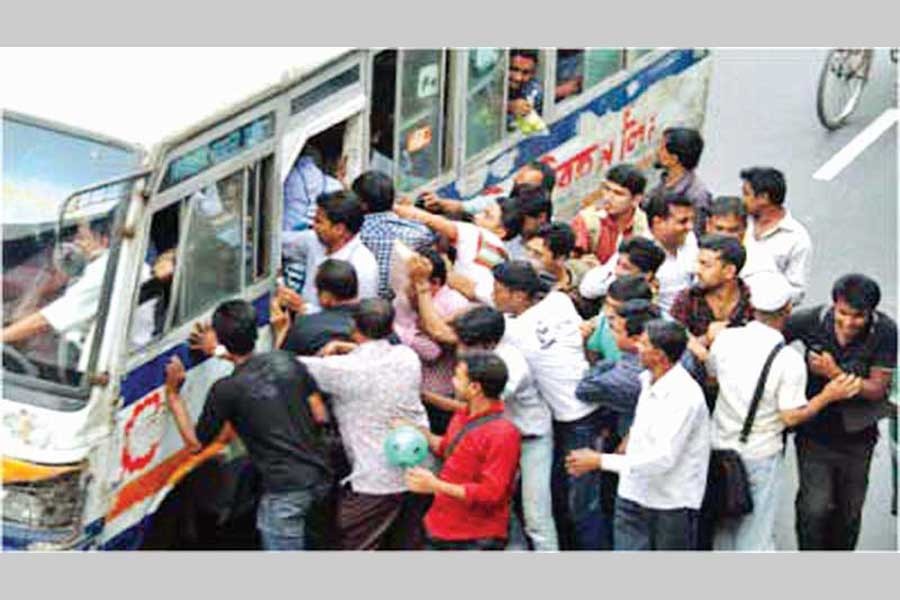
Published :
Updated :

Many elderly people in Bangladesh can remember the media reports about the riotous situation in Kolkata sparked by a nominal increase in tramfare in the Indian city. The mayhem occurred in the early 1950s. After the recent hike in the fare of buses plying the country's different routes including those in the capital, the urban life hasn't yet witnessed any noticeable outburst of violence. But altercation between passengers and bus conductors continues unabated over the charges in excess taken for certain distances. The rate at which the bus fares have been raised could have served as a ground for trouble-makers looking for a pretext of trouble. Unlike the Kolkata commuters in the 1950s, those in Dhaka nowadays do not resort to provocative acts on the spur of moment. As a result, small quarrels between the passengers and bus conductors keep making the bus trips inside Dhaka city virtually a bitter experience.
At present, a potent cause of the bus passengers' anger while on a trip is the coerced payment of excessive fare on vehicles which have evidently won the battle of the latest fare hikes. According to a recent government circular, the privilege of charging increased bus fare is set to be enjoyed by 'diesel powered' transport. The 'CNG driven' buses are out of the purview of the privilege. The rise in passenger fare follows the latest fuel price hike and a call of indefinite strike by the public transport owners. The strike was withdrawn after the government announced the bus-fare increases across the country. Against this backdrop, a section of bus operators resorted to irregularities by cheating the passengers. The CNG-run buses also began charging passengers like those run on diesel. The ill practice falls in the category of a crime of sorts resorted to by rogue elements. On receiving allegations from aggrieved passengers, the BRTA executive magistrates in raids conducted by their mobile courts began checking buses. The mobile courtshauled up the errant buses with the help of police. As part of a stop-gap solution, the BRTA is now pasting stickers on the fronts of the buses informing passengers on which fuel a bus is running.
This is, undoubtedly, a pragmatic solution. But the general bus commuters are also aware of the other cunning practices followed by a section of the bus staff to cheat them. Moreover, the black sheep in the administrations concerned keep biding time to enter into collusions with obsessively corrupt elements. At the end, the innocent passengers remain vulnerable to more ill devices designed by the syndicate active in the public transport sector.
Whether the government's step to go for a fuel price hike, leading to unwarranted situations inside the city buses, is a timely one or not is a separate issue. Yet, many might feel the need for a public debate, or a review of the fare-hike decision. According to experts in the social and economic circles, the authorities could have given the pandemic- and one-and-half-year shutdown-hit people a breathing space of sorts before they wade into uncharted waters left by the Covid-19 socio-economic stalemate.
Coming to the country's public transport sector, that comprises both buses and launches, it has yet to prove its public friendliness. The moment a person is on board one of these transports, which are not exclusive, he or she finds himself or herself to be at their mercy. In plain, before the passengers reach their destinations, they have to keep themselves hostage to the transport crew including the drivers and conductors.
Passengers on the water transports, especially travelling by launches are relatively free from this state of being under a siege of sorts. But on buses, the ordeal starts from the very charging of fares higher than that fixed by the authorities. It drags on with heated exchanges with the bus people often dropping passengers far ahead of or beyond the fixed stoppages. In the cases of 'sitting buses', taking in passengers from improvised stoppages draws the ire of many travellers.
These being a few aspects, the major ordeal that makes the passengers feel their adrenaline rush is the spectres of accidents and tragic deaths. Instances of exemplary punishments caused by reckless driving are few and far between. Nervous bus passengers in the country, like the first-time flyers, thus, hardly feel relieved until they reach their destinations. To even the seasoned commuters in the Bangladesh cities, the bus journeys offer them a test of the strength of their nerve. On the long-distance travels, it's not the collision of two competing buses sideways; it's the fear of frontal crashes of the heavy coaches which keep chilling the bones of the shaky passengers. In such a fraught scenario, rewarding the bus operators with generous incentives at the expense of the passengers' pockets may not earn approval of the fixed-income people. It's only natural, and here lies the crux of many problems besetting the public transport sector.
Social welfare and rights activists have disapproved outright the decision to increase the bus fares. What galls them the most is the way the authorities buckled under the pressure of the bus operators across the country. After every bus fare-hike attempts prompted by even nominal oil price rise in the international market, the buses and goods carriers have long been calling strikes in the country. Keeping off the roads to cause difficulties to passengers and traders has become the norm. They know well the government has little choice but to give in to their pressure. This time the striking transport sector must have rejoiced at their easy victory. But according to the passenger welfare bodies, the transport operators' cakewalk may have made ways for the invisible agents of unrest and passenger sufferings in the coming days.


 For all latest news, follow The Financial Express Google News channel.
For all latest news, follow The Financial Express Google News channel.